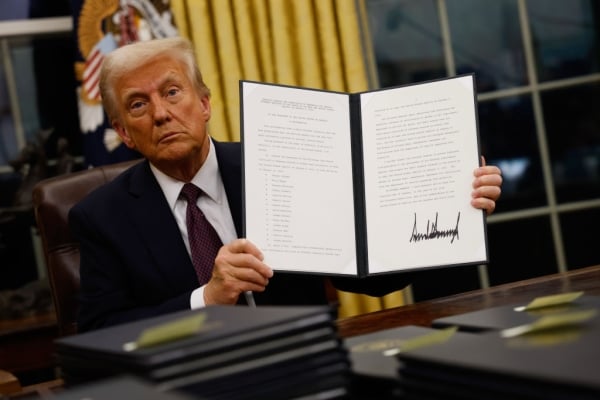The second Trump administration has begun with a cacophony of executive orders, memos from the Office of Management and Budget, and the disconcerting disappearance—and some reappearance—of research grants and programs. This has led to fear of the loss of important federal data, threats to the livelihoods of researchers and students, and the end of critical programs that have enabled greater participation in science. Many of these actions are being litigated in the courts, and while some judges have helped stop the worst actions, the whiplash leads to more drama and uncertainty. The research community on college campuses has been left in a state of anxiety and confusion.
The public response from college presidents has been mostly muted so far. While this is causing even more distress in some quarters, there are reasons for it. The administration has suggested that on top of the current actions, there are prospects for increasing the tax on large university endowments, cutting indirect cost recovery on federal grants, investigating students and institutions for antisemitism, and more. It’s no surprise that university presidents, general counsels, communications professionals and federal relations officials want to play it safe. Many of these leaders probably also feel constrained by their commitments to institutional neutrality and don’t want to be seen as taking a political position against the administration’s actions.
And so higher education is in yet another crisis. This one affects the whole country, just like the 2008 financial crisis and the pandemic. Former Tulane University president Scott Cowen faced a unique local crisis after Hurricane Katrina and also navigated the pandemic as interim president at Case Western Reserve University. He has been justifiably praised as an outstanding crisis manager, bringing Tulane through an event that easily could have permanently devastated the institution. He said on this site that—both after Hurricane Katrina in New Orleans and during COVID-19 in Cleveland—frequent, emotionally transparent communication was crucial to lower anxiety and provide updated information.
“Crises are bound to happen,” he said, “impacting a few people or everyone. How we lead through them depends in large part on the nature of the crisis. And when one strikes, a leader should first understand how that particular crisis makes them feel” (emphasis mine).
We don’t need to wonder about how people feel this time. The current crisis is definitely making people on campuses anxious and afraid. A few presidents have heeded Cowen’s advice and made public statements, including Christina Paxson at Brown University, Maurie McInnis at Yale University and Kevin Guskiewicz at Michigan State University. These statements have all acknowledged the pain and anxiety on the campuses. All three of these presidents are quite experienced: Paxson has been in office at Brown for 12 years, and McInnis and Guskiewicz are both in their second executive positions.
Paxson perhaps went the farthest in taking a stand. “We always follow the law,” she said. “But we are also prepared to exercise our legal right to advocate against laws, regulations or other actions that compromise Brown’s mission.” That would be a difficult statement to make at a public university in a red state—and is still quite a courageous one at a private one in Rhode Island.
Other presidents have made similar statements, and as the situation grinds on, more will continue to do so, particularly as it becomes apparent that this is not something to be waited out but rather to be managed and adapted to. Nearly every college president cares first and foremost about their campus; when they don’t show it, it’s usually because they think doing so would cause more damage in the long run. My heart goes out to all of the officials who for two weeks—and for many weeks to come—have had long early-morning and late-night meetings trying to figure out what they can and cannot do or say. Being in the foxhole late at night with your team and college town takeout can be energizing at first, but as it continues, it gets very difficult, especially as the days start to blur and it’s hard to remember whether you’ve already decided something or not.
I went through two crises myself as chancellor of University of North Carolina at Chapel Hill. I followed Cowen’s advice on the first one, the 2008 financial crisis; I had seen him present on what he did at Tulane at my first presidents’ meeting. I sent out frequent emails to the campus with the help of a very sharp communications colleague who helped me craft my voice for such times. I went to employee meetings and answered all the questions I could. I hugged people when appropriate and let them share their emotions. As an autistic person, I don’t always know when emotions are in the air, but this was a dire enough situation that I didn’t need to do a lot of interpreting. We got through it, and I felt even more connected to the campus when we did.
In the second crisis, which was a local scandal involving UNC athletics, I started off on the right foot by famously apologizing to “everyone who loves this university” at the first press conference. It seemed a logical continuation of what had gotten me through my first crisis, and it was consistent with what I had learned from Cowen. But the reaction was very different. While much of the campus appreciated it, the sports fans ridiculed me for being apologetic and not having a “stiffer spine” when it came to fighting for athletics. To my literal brain, this meant they wanted me to say it was acceptable that we cheated. I should have ignored that, because it caused me to lose my voice for a year or more, during which I just looked tongue-tied and indecisive while the scandal grew. As with the current situation, I was worried that saying anything would lead to more investigations and penalties for the Tar Heels. Finally, a wise adviser told me that I needed to decide who my people were. The people on the campus—the students, staff and faculty—those were my people. The sports fans were not; I can’t make a layup to save my life. “Stick to your people,” he said. I eventually got my voice back and happily went off to a Division III university.
As the current crop of presidents goes through this same process, they’ll begin sticking with their people, too. Like me, many of them will end up wishing they did it sooner, but that’s to be expected given the stress and tension. In the long run, we need leaders who can lead the academic community to the other side of this. And that doesn’t always mean overt “resistance” as we often hear calls for, although as Paxson said in her letter, it certainly does mean standing up for the academic freedom of the individuals on the campus. It also means understanding the situation, caring for the people under their charge who are affected, helping them grieve for what is being lost and leading a conversation about how higher education is going to adapt to the new realities without sacrificing our values. I believe those leaders will emerge.
As McInnis said at Yale, “Our mission is to create, share and preserve knowledge; to educate and inspire students; and to apply our discoveries to address the world’s greatest challenges. We are committed to navigating these times with a steadfast focus on advancing that mission and on supporting members of our community.” Most of the college leaders who read this and don’t think they can say something like it are wishing they could. In the coming weeks, more will.
In the meantime, the academic community needs to stick together and try not to get overwhelmed by responding to everything that comes along while also acknowledging the fear, loss and pain many are experiencing. Teaching, patient care, research, justice and opportunity have defined American higher education for a century. And, somehow, they will continue.
Holden Thorp is the editor in chief of the Science family of journals. He previously served as the chancellor of the University of North Carolina at Chapel Hill and the provost of Washington University in St. Louis.







